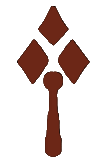
Tarot as a medium for cardplay is an often-neglected one in modern times, despite that the cards originated for this purpose. The Quantum Chromatic Tarot have been designed accordingly: that is why they are labeled with corner indices, rather than text labels. They are likewise designed with ease of distinguishability in mind: Majors have special, ornate borders; Court cards are fully illustrated; pip cards stand against blank backgrounds; the Fool has its own special design.
Tarot cards have in various forms been used for playing card games around Europe since at least the 1400s. They have used various suits and numbers of trumps, up to 40(!) in the now-extinct game of Minchiate. Virtually all of them are trick-taking games and will feel somewhat familiar to fans of games like spades or euchre.
Jeu de tarot, literally the “game of tarot” or French tarot, is the most popular of these today. Others such as scarto and Königrufen remain popular in Italy and Austria, respectively. The reader is encouraged to explore the rules to these, and play them with this deck. A fuller list of tarot games is below.
| French | Italian |
|---|---|
| ♠ |  |
| ♥ |  |
| ♦ |  |
| ♣ |  |
Yes! Just remove the knights, the Majors, and the Fool (unless you're using it as a joker), and it's just the same as a regular "French" deck of cards. Pages are the equivalents of Jacks. You can even see the corresponding suits on the bottoms of the face cards, but for your convenience they're listed here. Notice that Swords/Batons are the black suits and Cups/Coins are the red ones? In Italian suits, instead of "red" or "black", suits are "long" (Swords/Batons) or "round" (Cups/Coins).
A game of the author’s invention has been included in this book. It is called “Bad Moon” (yes, after the CCR song, although it has relevance to the game) and is intended to be fast-moving and strategic without becoming bogged down in the math and complex bidding of the games mentioned above. Furthermore, each player may be presented with strategic dilemmas where they may want (or need) to help other players as well as themselves. In this way it is a much more intuitive and subtle game than many of its counterparts and is well suited to this deck. The rules are described in full here. A reference card is included as well to help remember scores and things - so go find 2-4 friends to play with you and go try it out!
The following is a list of other tarot games that you may find interesting. If this doesn't whet your whistle, you can find a pretty comprehensive list here.
| Name | Author / Country of Origin | Players | Trick-Taking Game? | Description |
|---|---|---|---|---|
| Jeu de Tarot | France | 3-5 | Yes | Also known as French tarot, probably the most widely played tarot game today. It is fun, fast-moving, and not excessively complex once you understand the scoring. |
| Königrufen | Austria | 4 | Yes | A popular Austrian tarot game. Learn this if you're not afraid of lots of rules. |
| Scarto | Italy | 3-4 | Yes | A simple Piedmontese Italian game, especially if you omit the quirky rule where 20 is higher than 21 for no reason. |
| Tarot Solitaire | Jack of Wands (2017) | 1 | No | This is an elegant variant of tarot solitaire that uses the entire deck. I play it all the time. |
| Chicks Rule | Narj | 3-5 | Yes | A straightforward trick-taking game with a minimal ruleset, making it easy to learn. |
| Foolery | Jared McComb | 2-5 | No | Not a trick-taking game. The Fool has a special role here, adding something a bit different. |
| K.U.R.S. (Kemetic Unorthodox Rat Screw) | The Entropic Trinity | 2-4 | No | A tarot-based variation of Egyptian Rat Screw, with some funky rules to engage with the cards and spice things up. |
| Novatarok | John Wright | 2-4 | Yes | A cleaner, simpler variant of the classic tarok trick-taking game. |
| Wizard's Grimoire | Dokuga Kazu | 2-6 | No | Major departure from the usual trick-taking games, with spellcasting and everything. Pretty cool stuff. |
| Tarot Solitaire Collection | Various | 1 | No | A collection of tarot solitaire games, a lot more thematic and tarot-centered than the above. |
Apart from being a good time, cardplay can engage the mind, heart, and spirit in ways complementary to divination. It is a form of therapy of its own, allowing one to explore relationships and one’s own thoughts, responses, and interactions while engaging the rational mind.
A slower game can also allow for observation and interpretation of individual cards as they come into play, and events and choices that follow from them. This is true of competitive, cooperative, and solitaire games all. Just remember to have fun, it is much more therapeutic that way.